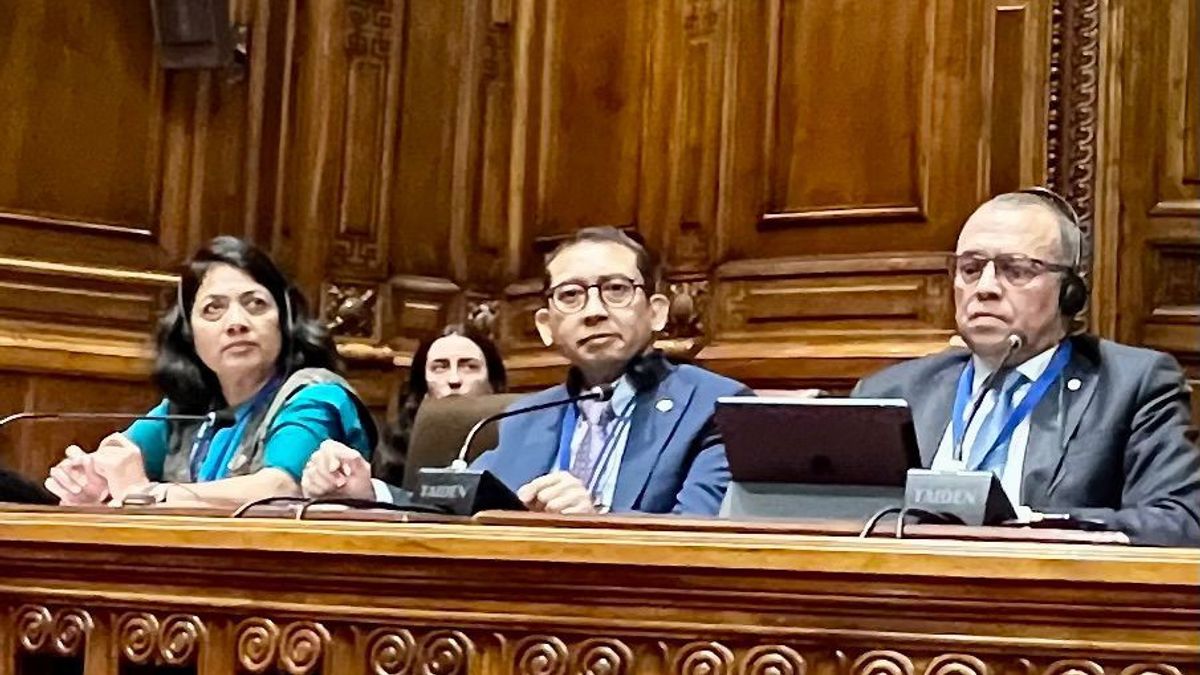JAKARTA The rapid advancement of technology and social transformation requires parliament around the world not only to adapt to change, but also to proactively form a future through appropriate policy responses for the community.
Parliament must be able to formulate an innovative approach to challenges that arise as a result of new technologies, including artificial intelligence (AI), to democratic principles and people's welfare.
In the midst of this crucial global background, the Delegation of the Inter-Parliamentary Cooperation Agency (BKSAP) of the DPR RI participated in finding a solution with the world parliament that is members of the Inter-Parliamentary Union (IPU) at the World Future Committee Summit (Summit of the Committee of the Future) in Montevideo, Uruguay.
Chairman of the BKSAP DPR RI, Fadli Zon, who is one of the main panelists in the plenary themed Challenges in Parliamentary Work in an Era of Change, shared his views on parliamentary strategies to embrace the future and overcome new technological challenges through international cooperation.
He highlighted the main challenges in integrating technology in the work of parliament.
Fadli assessed the importance of cultivating the culture of integrity and structural change within the legislature to facilitate the adoption of new systems and technological innovations.
Underlining the importance of capacity development, he also explained that there are still shortcomings in digital skills, technical knowledge, and information literacy in parliament.
"Therefore, it is important for parliament to take advantage of technological potential effectively through resource support and technical knowledge," explained Fadli, in his statement, Wednesday, September 27.
Fadli Zon also highlighted the importance of ensuring that technological innovation must truly reach all levels of society, including marginalized communities and groups, while maintaining democratic values in their development.
"Democracy is not just a government system, but a set of ethical principles that ensure representatives, accountability, and transparency. Technological development should not ignore these basic principles," he said.
"So it is important for parliament, through its function, to establish policies that guarantee the privacy and security of data to protect citizens' rights, address digital inequalities and ensure equal access to technology, strengthen cybersecurity and fight disinformation that can endanger the integrity of democratic institutions, and be aware of potential biased algorithms (algorithmic bias) in the use of data and technology to ensure fair and equal decision-making," continued Fadli Zon.
Regarding the challenges posed by Generative Artificial Intelligence (AI), Fadli Zon advocates ethical and responsible AI development. "It is very important to find the right balance between encouraging innovation and protecting against the potential dangers posed by new technologies," he said.
Fadli emphasized the need for a strong, but also flexible and adaptive regulatory framework for technological developments that continue.
Regarding incentives to encourage capacity development and investment in AI-based sectors, Fadli Zon recommends a multi-asspect approach including tax incentives, research grants, and partnerships between the education and industrial sectors.
He emphasized the importance of fostering skilled workers through education, as well as adequate research and technology development centers.
"Involving partnerships between the government and the private sector through public-private-partnership can also attract investment and promote AI innovation," he said.
In his presentation, the Chairman of BKSAP also emphasized the importance of identifying key areas and demographics that require special attention in AI development to protect the public from potential risks.
He encouraged the implementation of strong security measures in important infrastructure such as public health services, finance, and public transportation, as well as emphasizing the need for strict supervision in sectors that in the future will depend heavily on AI.
He then added, in the development and supervision of the implementation of new technologies, parliament must protect vulnerable and marginal populations from potential bias and algorithmic discrimination inherent in the AI system.
"It is the responsibility of parliament to formulate legislation that upholds the principles of justice, transparency and equality in technology", he said.
VOIR éGALEMENT:
Ending his presentation, Fadli Zon also emphasized Indonesia's commitment to protecting and advancing digital transformation for Micro, Small and Medium Enterprises (MSMEs) through policy initiatives, such as Law no. 1 of 2013 concerning Micro Financial Institutions.
"We will continue to strive to encourage economic diversification and innovation, while ensuring strong and inclusive social protection for the segment of society most vulnerable to technological changes," he said.
The English, Chinese, Japanese, Arabic, and French versions are automatically generated by the AI. So there may still be inaccuracies in translating, please always see Indonesian as our main language. (system supported by DigitalSiber.id)


















